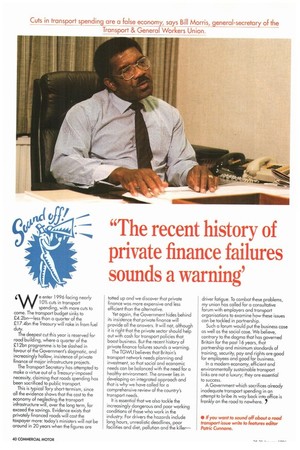"The recent history of private finance failures sounds a warning'
Page 42

If you've noticed an error in this article please click here to report it so we can fix it.
4 w
e enter 1996 facing nearly 10% cuts in transport spending, with more cuts to come. The transport budget sinks to £4.2bn—less than a quarter of the £17.4bn the Treasury will rake in from fuel duty. The deepest cut this year is reserved for road building, where a quarter of the £12bn programme is to be slashed in favour of the Government's dogmatic, and increasingly hollow, insistence of private finance oF major infrastructure projects. The Transport Secretary has attempted to make a virtue out of a Treasury-imposed necessity, claiming that roads spending has been sacrificed to public transport. This is typical Tory short-termism, since all the evidence shows that the cost to the economy of neglecting the transport infrastructure will, over the long term, far exceed the savings. Evidence exists that privately financed roads will cost the taxpayer more: today's ministers will not be around in 20 years when the figures are totted up and we discover that private finance was more expensive and less efficient than the alternative.
Yet again, the Government hides behind its insistence that private finance will provide all the answers. It will not, although it is right that the private sector should help out with cash for transport policies that boost business. But the recent history of private finance failures sounds a warning. The TGWU believes that Britain's transport network needs planning and investment, so that social and economic needs can be balanced with the need for a healthy environment. The answer lies in developing an integrated approach and that is why we have called for a comprehensive review of the country's transport needs.
It is essential that we also tackle the increasingly dangerous and poor working conditions of those who work in the industry. For drivers the hazards include long hours, unrealistic deadlines, poor facilities and diet, pollution and the killer—
driver fatigue. To combat these problems, my union has called for a consultative Forum with employers and transport organisations to examine how these issues can be tackled in partnership. Such a forum would put the business case as well as the social case. We believe, contrary to the dogma that has governed Britain For the past 16 years, that partnership and minimum standards of training, security, pay and rights are good for employees and good for lousiness. In a modern economy, efficient and environmentally sustainable transport links are not a luxury; they are essential to success.
A Government which sacrifices already inadequate transport spending in an attempt to bribe its way back into office is frankly on the road to nowhere.
































































































